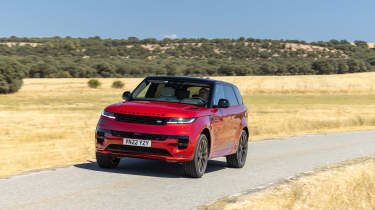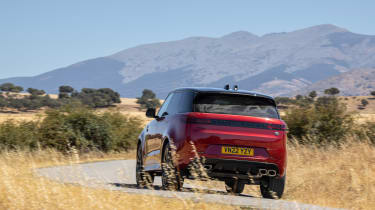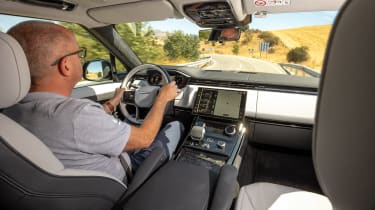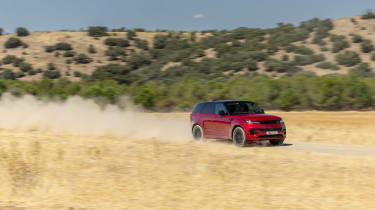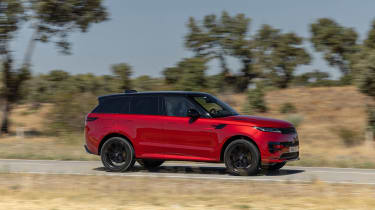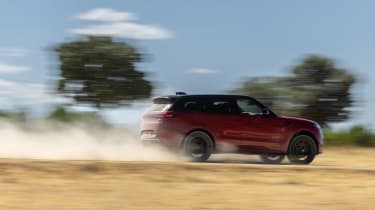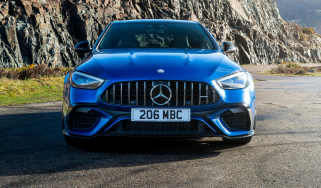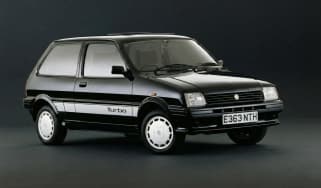New Range Rover Sport P530 2022 review
Range Rover’s new Sport arrives with BMW V8 power, impressive new dynamics and a level of quality that pushes the model to class above
Out with the old, in this case the five-litre supercharged V8 that served Land Rover and Jaguar across everything from XE saloons to Range Rovers, and the boisterous Range Rover Sport SVR. And in with the new, the new being Land Rover’s new V8, which is actually BMW’s 4.4-litre twin-turbo V8 that you’ll find in the likes of an M550i.
As quick as the outgoing SVR but 17 per cent more efficient, the new Sport P530 will be a small player in the model’s sales makeup, especially so in the UK, but if you’ve been put off by the overt approach of the now defunct SVR, the P530 might tempt you away from the in-line six-cylinder petrol and diesel and plug-in hybrid models that will make up the bulk of sales.
Should you be tempted by something weighing 2430kg and powered by a V8 petrol engine you’ll find yourself with a performance SUV that steers closer to being a genuine luxury car as it is as a mountaineer – and a driver’s car quite a few levels below that. If this sounds damning with faint praise, it’s not meant to.
Land Rover has gone to considerable lengths to raise its game when it comes to the quality of its new Sport range, not just in regards to materials used and the fit and finish – which now matches the asking price (£116,190 for a First Edition Autobiography since you asked) – but also in how it drives.
More reviews
Reviews
- Range Rover Sport SV 2025 review – the king of fast SUVs?
- New Range Rover Sport P530 2022 review
- Range Rover Sport HST 2020 review - is the new straight-six petrol a good fit?
- Range Rover Sport Overfinch Supersport review - for when a Range Rover Sport SVR just is too subtle
- Range Rover Sport SVR (2014-2022) review – Land Rover's big bold hot rod SUV
Predominantly this is down to the latest Range Rover underpinnings the Sport is built upon. Therefore, while it will still crawl up rocks, tiptoe down the side of a ravine and pivot on its axis around immovable objects on impossibly tight tracks, it now also enjoys a higher level of agility on the road, too.
There’s enough technology assisting the new Sport to fill the internet, and not all of it just to allow it to nail its off-road brief that customers, according to Range Rover, carry out with frequent regularity. On the road it feels more securely tied down than the car it replaces, its body more controlled, each corner less easily deflected off your chosen line. The steering wheel is calmer between your fingertips; the lateral body movement that made its predecessor feel it was never truly settled all but eradicated.
This calmness and precision comes from the hand of new Vehicle Engineering Director, Matt Becker, who despite joining after the hardware had been signed off has still been able to guide his team to develop and tune the software that controls it all to a standard far higher than your expectations.
“The bandwidth we have with the system’s technology and software looks daunting at first,” says Becker, “but it allows us to fine tune each model and trim line individually with a level of accuracy I don’t think anyone would expect on a car such as this.”
A Stormer Handling Pack, yours for £5330, was fitted to our test car consisting of Dynamic Response Pro, all-wheel steering and an electronic active diff with torque vectoring by braking. It’s combined with the ability to individually configure steering, engine, gearbox and the standard air springs between Comfort and Dynamic, and it’s an option very much worth considering. It’s at the heart of what makes the P530 such an improvement over its predecessor.
It’s not as pin-sharp as Becker’s previous SUV, Aston Martin’s DBX, it was never intended to be. But there’s a significant step up in fluidity in how it conducts itself, flowing with unexpected poise where previously it was a bit lumpy and inconsistent. The 48-volt active anti-roll bar system plays a big role in allowing the Sport to maintain such calmness. There’s no need for constant corrections to be made, no requirement to manage the mass, although there is no escaping that huge weight, especially under braking when within half a dozen heavy stops from speed the pedal gets a little longer with each application.
By switching to BMW’s twin-turbo V8 Range Rover has a more advanced, more sophisticated engine for the Sport’s current performance offering (an SVR will arrive next year with the BMW M5’s V8). It’s far more refined than the old supercharged V8, and its 532bhp (up 43bhp) and 553lb ft (down 37lb ft compared to the non-SVR tune) and is delivered in a less feral way.
On first impressions it doesn’t feel as quick as the numbers suggest off the line – it matches the SVR in reaching 60mph in 4.3-seconds, but its 155mph maximum gives away 21mph – yet it has a far wider operating window, its torque spread is broader, and its power delivery less peaky. But by having a wide performance window it’s much easier to maintain a higher pace more of the time. Its smoother and more linear power delivery is far more relaxing than anything that has gone before. The eight-speed gearbox would benefit from snappier shifts when you’re pushing on, but as previously mentioned, the new Sport isn’t designed to go head-to-head with its Gaydon neighbour.
Every area of this new Sport is an improvement over the one it replaces. The chassis is rarely flustered, the ride calming and quiet even with 23-inch wheels fitted. The all-season tyres do generate more noise than you might expect, though, and during high speed cruising they don’t offer the stability and confidence of Porsche’s Cayenne or a DBX. And as per the new Range Rover there’s still work to be done on the high level of wind noise around the A-pillars. These are downsides that are all fixable with some additional lines of code written and sent to the car over-the-air waiting for the owners to download. New seals are under discussion.
As a luxury car Range Rover has created a cabin ambience that has its rivals licked. Bentley offers more ornate detailing and a higher quality feel to its switchgear, with many of its systems less complex to operate, and Aston’s DBX is more creative when it comes to making the best use of the interior space, but the Sport – along with the Range Rover – is beautifully trimmed, the mix of materials on offer providing genuine luxury benefits rather than being token gestures to grab a headline or two. Externally its design is less aggressive and more considered, its on road presence less ostentatious than its predecessor.
Previously mentioned issues aside, the new Sport P530 remains a compelling proposition and will undoubtedly continue to find more homes than Range Rover can imagine, likely including a few more evo readers than many of us would expect.
Prices and rivals
For now, the V8-powered P530 Range Rover Sport is exclusively available with the First Edition package from £116,190. It’s a big number, one that puts it right into the firing line of some serious high performance SUV rivals including the Audi RSQ8 (£110,665), Porsche Cayenne Turbo (£112,400), BMW X5 M Competition (£118,920) and AMG’s GLE63 S (£123,725).
Of course, Land Rover will consider the new Sport a rung above the German competition, where it does sit substantially below higher-end rivals like the Aston Martin DBX or Bentley Bentayga. Another consideration is that unlike largely all its key rivals, the Sport will still be able to traverse challenging off-road scenarios, giving it a leg-up in terms of bandwidth – something all these large luxury high-performance SUVs sell themselves on.

